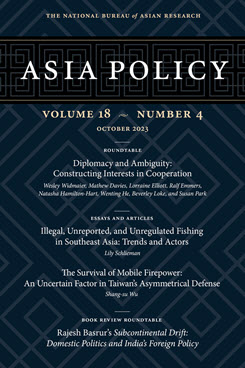Article in Asia Policy 18.4
The Survival of Mobile Firepower
An Uncertain Factor in Taiwan’s Asymmetrical Defense
This article considers the strategic importance of mobile firepower for Taiwan’s asymmetrical defense and analyzes the geostrategic threats to the survival of Taiwan’s mobile surface-to-air missiles (SAMs) and standoff firepower.
Executive Summary
MAIN ARGUMENTt
In the face of China’s military superiority, Taiwan has adopted an asymmetrical approach to its defense that relies significantly on mobile SAMs and standoff firepower to deny People’s Liberation Army (PLA) platforms, such as transport aircraft and landing ships, access to the island. Mobility presents a tactical advantage for Taiwan, as it renders Chinese surveillance more difficult. However, Taiwan’s mobile units could be constrained or rendered immobile given the geographic environment in Taiwan, especially in urban regions like the Taipei metropolitan area. At the outbreak of a potential war with China, Taiwan’s mobile units could face preemptive strikes, and concealing the deployed units for an indeterminate time while awaiting a PLA invasion would also be challenging. The amount of mobile firepower that Taipei can retain after PLA attacks may determine whether Beijing’s invasion is successful, but with a narrow margin for losses and an incomplete buildup, Taiwan’s mobile firepower may nevertheless not be adequate to redress the island’s military inferiority. To consolidate the status quo in the strait, Taipei should strengthen its mobile firepower and Washington should offer critical support.
POLICY IMPLICATIONS
- Although there is no clear minimum level of firepower that Taipei would need to retain in an attack scenario, the current margin is narrow. If the PLA efficiently neutralizes Taiwan’s mobile units, Taiwan’s asymmetrical defense would be significantly undermined or even fail.
- Moving and hiding mobile units around Taiwan could be challenging, given that suitable routes in urban and mountainous areas are predictable and could be cut off. To thwart a potential PLA invasion, the mobile units would also need to be hidden for an indeterminate period, which could be difficult. The necessity of defending Taipei would further reduce the tactical flexibility of the mobile units.
- China has various surveillance and attack means that could be used to neutralize Taiwan’s mobile units and defensive means to lower the threat from mobile firepower. The efficacy of these measures and the extent to which Beijing could concentrate them for this mission is uncertain.
- Third parties, particularly the U.S., are crucial in strengthening Taiwan’s mobile firepower, especially in terms of quantity and evaluation.
Shang-su Wu is an Assistant Professor at the Rabdan Academy in Abu Dhabi (United Arab Emirates). His research interests include defense issues in East and Southeast Asia and the role of railways in international relations.
About Asia Policy
Asia Policy is a peer-reviewed scholarly journal presenting policy-relevant academic research on the Asia-Pacific that draws clear and concise conclusions useful to today’s policymakers. Asia Policy is published quarterly in January, April, July, and October and accepts submissions on a rolling basis. Learn more


